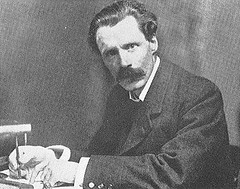George Gissing: A man I had never heard of until I started my English degree. And now a man whose genius I will be announcing to anyone who will listen. Everyone has heard of Dickens, Thackeray, Hardy, but Gissing remains well known only to the elect few. In my opinion his novels are far more fascinating than those written by the "greats" of Victorian literature. Unlike many of the others, Gissing's novels have the ring of truth, and seem like voyeuristic glimpses into the painful, private lives of their characters.
Gissing had a fascinating life, and he clearly drew a lot of inspiration from reality. Born in 1857, his family were never rich but he received a good education, promptly interrupted when he was caught stealing money to give to a prostitute, Nell Harrison, with whom he had become totally infatuated. After a month's imprisonment, Gissing was exiled to America, and returned several years later, desperately poor and friendless. He married Nell Harrison, but it was not a happy union - Nell was a drunkard and often returned to prostitution. Gissing eventually paid her to live apart from him.His first novel was a complete flop, although it was largely biographical, telling of his marital strife and discussing the lives of the most desperate levels of poverty in London's slums. Nell eventually died of poverty and venereal disease in 1888, and he married his second wife, Edith Underwood, not long after. This was even more disastrous than his first marriage - Edith became mentally unstable and violent, and had to be committed to an asylum (I always wonder, when biographies say something of this sort, whether the woman was really mad or just miserable, stunted and lonely, but time has erased these truths). Eventually he formed a union with Gabrielle Fleury, a young French translator, and he went to live with her and her mother in Paris, leaving his wife under the supervision of relatives. He eventually died of emphysema in 1903, aged only 46, having spent a vast part of his life in poverty and misery at home.
To me the genius of Gissing's writing is his ability to see inside the hearts of all his characters, high or low, rich or poor, he appears to have that incredible ability to empathise with everyone and anyone which is so rare for an author. The plot of his most widely read novel today, "New Grub Street", is in parts very similar to that of George Eliot's "Middlemarch" : poor husband, rich wife, wife inconsiderate and whinging, marriage fails. But the story of Amy and Reardon is far more beautifully rendered in "New Grub Street" than that of Rosamund and Lydgate in "Middlemarch", because Gissing understands the character of Amy to the extent where we understand her behaviour, and see the fragility of good intentions in a world of adversity. In short, Gissing's empathy enables us to sympathise with all his characters, and consequently makes us believe in his story to the point where it is hard to believe it is any longer a story. We have a sneaking suspicion that we may not have acted so very differently if the situation had been ours.
To give you a taste of this, I have copied a part of Chapter XXIV, Part IV of "New Grub Street", the most convincing part of the book in my opinion:
Both had come to this meeting prepared for a renewal of amity, but in these first few moments each was so disagreeably impressed by the look and language of the other that a revulsion of feeling undid all the more hopeful effects of their long severance. On entering, Amy had meant to offer her hand, but the unexpected meanness of Reardon's aspect shocked and restrained her. All but every woman would have experienced that shrinking from the livery of poverty. Amy had but to reflect, and she understood that her husband could in no wise help this shabbiness; when he parted from her his wardrobe was already in a long-suffering condition, and how was he to have purchased new garments since then? None the less such attire degraded him in her eyes; it symbolised the melancholy decline which he had suffered intellectually. On Reardon his wife's elegance had the same repellent effect, though this would not have been the case but for the expression of her countenance. Had it been possible for them to remain together during the first five minutes without exchange of words, sympathies might have prevailed on both sides; the first speech uttered would most likely have harmonised with their gentler thoughts. But the mischief was done so speedily. New Grub Street, Chapter XXIV, Part IV
Gissing's book the Odd Women, is also well worth a read - a strange but wonderful story about women's rights during the Victorian era, discussing the "Odd Women", that is, those who remained single and hence were not part of a pair.
Gissing is an inspiring, moving author and I'm not sure quite why he has been so neglected as an author in the past, Now, I believe, he is enjoying something of a revival, and his works are beginning to be reprinted. So check him out! You will be surprised.


No comments:
Post a Comment